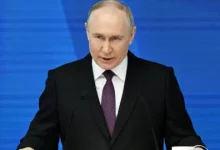Syria’s government has doubled public sector pay while at the same time cut fuel subsidies, as it tries to boost the war-torn country’s economy.
The announcements were made overnight, after the value of the Syrian pound fell to a new low against the US dollar on the parallel, or black, market.
The currency’s collapse has helped fuel hyperinflation and push 90% of the population below the poverty line.
The hardship has recently sparked rare protests in government strongholds.
Syria has been devastated and more than half a million people have been killed by the civil war that erupted after President Bashar al-Assad cracked down violently on peaceful pro-democracy demonstrations in 2011.
More than 15 million people – 70% of the population – require humanitarian assistance, with 12.1 million considered food insecure.
Presidential decrees issued early on Wednesday ordered a 100% increase in the salaries and pensions of civil servants, military personnel and government contractors – the first of such rise since December 2021.
They also set the overall minimum monthly wage for all workers at 185,940 Syrian pounds, which is worth $21.76 (£17.09) at the official exchange rate of 8,542 and $12.40 at the current parallel market rate of 15,000. At the start of the war, a dollar was worth 47 Syrian pounds.
The new minimum wage would only be enough to buy a third of the essential food that the World Food Programme (WFP) calculates a family of five requires each month, according to data from May. It would also cover just over a tenth of such a family’s minimum household expenditure.
Vulnerable households have been struggling to pay their bills due to spiralling inflation, with the minimum expenditure figure 62% higher than it was in May 2022 and 159% higher than in September 2021, according to the WFP.
In a separate statement issued overnight, the commerce ministry announced the total lifting of subsidies on petrol and a partial lifting of subsidies on fuel oil. —BBC





